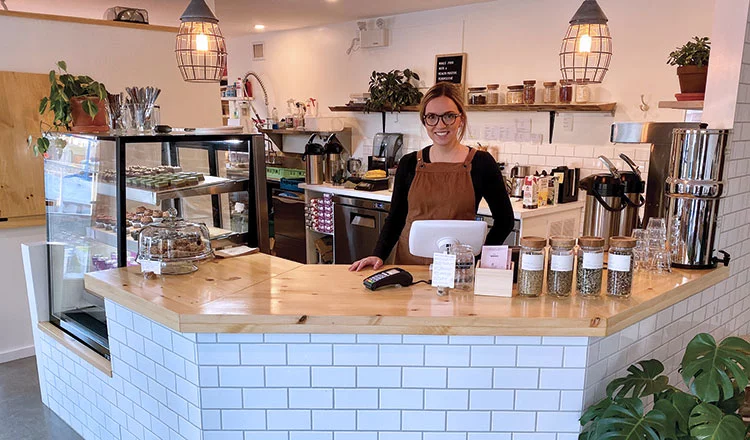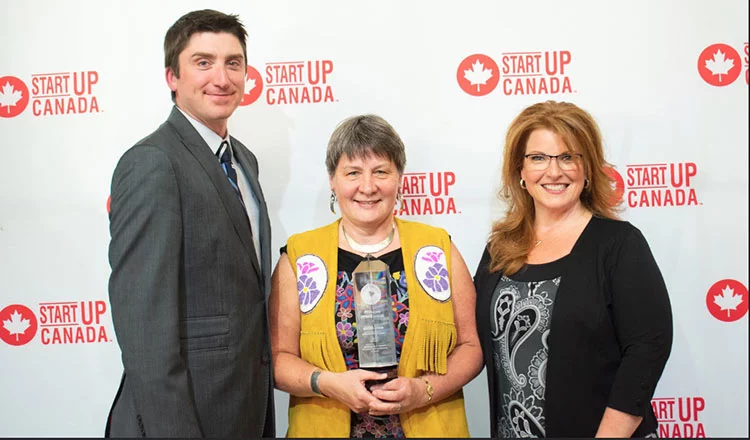Nicole Schoeneberg (left) and Hilary Seymour (right), owners of Summit Kombucha, enjoying their blueberry and basil kombucha, at their brewery
Have you tried kombucha; the effervescent sweet/sour beverage? Statistics say you likely have. This ancient fermented tea drink is now the fastest-growing market in North America and experts say it could be worth $3.5 billion by 2025. Summit Kombucha, Yukon’s first “booch” brewery has made a name for itself with its locally foraged northern flavours, including spruce tip and haskap. But what is it and how did it become so popular?
Kombucha is thought to have originated in China, around 221 BC, during the Qin dynasty with an emperor at the throne who was obsessed with health and immortality. He even tried to find an elixir for eternal life. I’d like to think the closest he came to it was kombucha and that it’s no coincidence the stuff was known as the “tea of immortality.” Centuries later, Korean physician Dr. Kombu brought back this tea to Japan for Emperor Inkyo as a health tonic. This is where the name kombucha originated. Eventually, due to the international tea trade, kombucha arrived in Europe in the early 20th century. There, it gained popularity in Russia (kambucha) and Germany (kombuchaschwamm). By then, booch had gone out of fashion in Asia and became a drink that your eccentric great-aunt brewed in her dank basement. This sentiment was reflected by my father, who laughed at me when I told him I was brewing my own. Eventually, mainly through word of mouth, the health benefits of booch came to light. Since the early 2000s, the market has exploded with brands offering dozens of creative flavours.
Hilary Seymour and Nicole Schoeneberg, owners of Summit, started selling their homemade booch last year at the Fireweed Market and kept selling out. They have grown enough in one year to move into their own brewery on Titanium Way. They have refill stations at Riverside Grocery, Midnight Sun Coffee Roasters and Baked. It’s also on tap at the Wayfarer Oyster House.
Seymour thinks the resurgence in popularity is due to its health benefits, particularly where gut health is concerned. It’s a great way to support digestive health, she said. As for the taste, someone who has never tried booch might find it a shock to the system. It has a unique zine. Even Schoeneberg thought it was “pretty terrible and very vinegary”when she first tried it, but she’s come to love it.
“Being at the Fireweed Market, where we started, was the best place to engage with people who never had booch before,” Schoeneberg said. “Having the opportunity to talk to locals and give out samples was effective. It wasn’t a hard sell after they tried it and they kept coming back!”
In fact, Yukoners love it so much that Summit had to triple production since last year’s market season. Now they brew around 35 gallons and host “make your own kombucha” classes, which typically sell out weeks in advance. Both Seymour and Schoeneberg said the local community has been supportive of Summit and Summit, in turn, likes to support local producers, harvesters and foragers. They use cucumbers from Yukon Garden and haskaps from Yukon Berry Farms.
Moving forward, they hope to be bottling or canning by next summer and then moving slowly into markets in the Northwest Territories and Alaska. Summit is already in Atlin, at the Trading Post, but the most important factor for them is to maintain a connection to the North.Have you tried kombucha; the effervescent sweet/sour beverage? Statistics say you likely have. This ancient fermented tea drink is now the fastest-growing market in North America and experts say it could be worth $3.5 billion by 2025. Summit Kombucha, Yukon’s first “booch” brewery has made a name for itself with its locally foraged northern flavours, including spruce tip and haskap. But what is it and how did it become so popular?
Kombucha is thought to have originated in China, around 221 BC, during the Qin dynasty with an emperor at the throne who was obsessed with health and immortality. He even tried to find an elixir for eternal life. I’d like to think the closest he came to it was kombucha and that it’s no coincidence the stuff was known as the “tea of immortality.” Centuries later, Korean physician Dr. Kombu brought back this tea to Japan for Emperor Inkyo as a health tonic. This is where the name kombucha originated. Eventually, due to the international tea trade, kombucha arrived in Europe in the early 20th century. There, it gained popularity in Russia (kambucha) and Germany (kombuchaschwamm). By then, booch had gone out of fashion in Asia and became a drink that your eccentric great-aunt brewed in her dank basement. This sentiment was reflected by my father, who laughed at me when I told him I was brewing my own. Eventually, mainly through word of mouth, the health benefits of booch came to light. Since the early 2000s, the market has exploded with brands offering dozens of creative flavours.
Hilary Seymour and Nicole Schoeneberg, owners of Summit, started selling their homemade booch last year at the Fireweed Market and kept selling out. They have grown enough in one year to move into their own brewery on Titanium Way. They have refill stations at Riverside Grocery, Midnight Sun Coffee Roasters and Baked. It’s also on tap at the Wayfarer Oyster House.
Seymour thinks the resurgence in popularity is due to its health benefits, particularly where gut health is concerned. It’s a great way to support digestive health, she said. As for the taste, someone who has never tried booch might find it a shock to the system. It has a unique zine. Even Schoeneberg thought it was “pretty terrible and very vinegary”when she first tried it, but she’s come to love it.
“Being at the Fireweed Market, where we started, was the best place to engage with people who never had booch before,” Schoeneberg said. “Having the opportunity to talk to locals and give out samples was effective. It wasn’t a hard sell after they tried it and they kept coming back!”
In fact, Yukoners love it so much that Summit had to triple production since last year’s market season. Now they brew around 35 gallons and host “make your own kombucha” classes, which typically sell out weeks in advance. Both Seymour and Schoeneberg said the local community has been supportive of Summit and Summit, in turn, likes to support local producers, harvesters and foragers. They use cucumbers from Yukon Garden and haskaps from Yukon Berry Farms.
Moving forward, they hope to be bottling or canning by next summer and then moving slowly into markets in the Northwest Territories and Alaska. Summit is already in Atlin, at the Trading Post, but the most important factor for them is to maintain a connection to the North.




